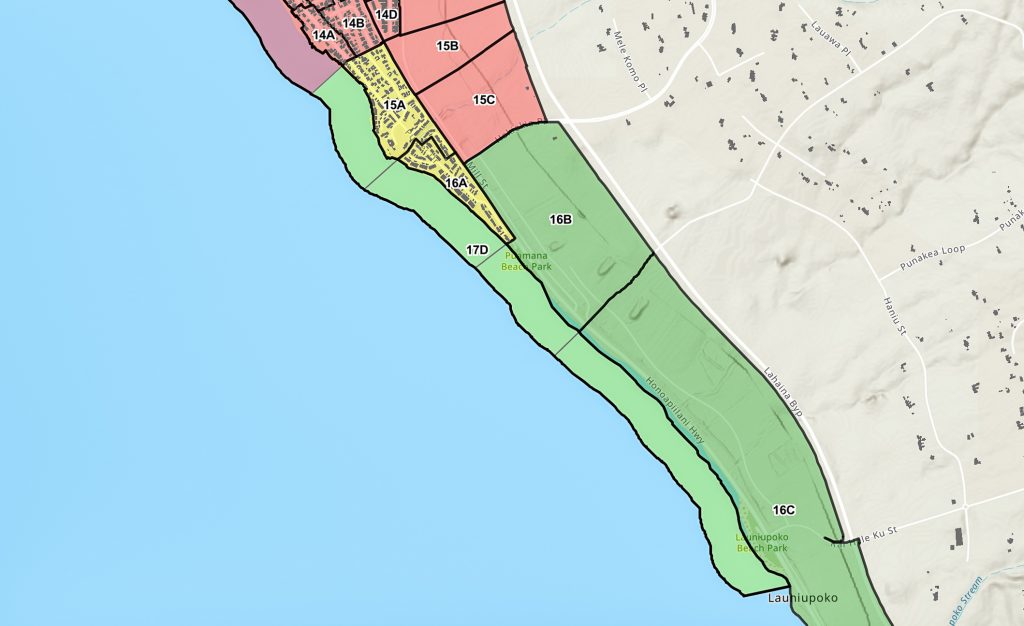Maui County lifted restrictions in five more zones in Lahaina burn zone: 5C, 6A, 9M, 16A, 17D

On Oct. 13, Maui County lifted disaster area restrictions for property owners and residents who live in zones 5C, 9M and 16A and for maritime zone 17D in the Lahaina burn zone.
- Residential Zone 5C: Ipukula Way, South Nahale Place
- Zone 6A: Māla Wharf, Front Street (For more information on Māla Wharf opening, click here.)
- Residential Zone 9M: Kanakea Loop, Kanakea Place, Kahako Street, Kaakolu Street, Kahena Street (local access only; ID with address or proof of residency required)
- Residential Zone 16A: Pualei Drive, Puamelia Place, Puakukui Place (local access only; ID with address or proof of residency required)
- Maritime Zone 17D: Between Launiupoko Beach Park and Kauaula Stream (beach access)
Access: To gain access to residential zones 9M and 16A, residents will be asked to provide an ID showing their address within the zone, or an ID plus additional documentation as proof of occupancy (see below for more details). To gain access to Zone 6A, from Honoapiilani Highway turn left onto Kapunakea Street, turn left onto Front Street, then turn makai onto Māla Wharf Road.
Roadways: All roadways to access these zones are clear for residents and property owners.
Maritime zone: Restrictions have been lifted by the US Coast Guard for water adjacent to zones 5A and 6A. Other Coast Guard restrictions are still active. For the most updated information, visit Pages – My Homeport Content (uscg.mil).
Water: The county Department of Water Supply’s Unsafe Water Advisory remains in effect in these residential zones. To view the water advisory, visit https://www.mauicounty.gov/water.
Safety and advisories: Once a fire has burned through an area, many dangers may remain. It is important to be aware of the hazards and to know what to look for when re-entering. For full safety details, visit www.mauirecovers.org. For air quality information, visit https://health.hawaii.gov/mauiwildfires/.
Suppport: A high level of support will be provided to returning residents during the first two days of re-entry into fire-damaged areas including water, shade, washing stations, portable toilets, medical and mental health care, MauiBus transportation from local hotel shelters and language assistance. Transportation to and from hotel shelters on Maui Bus circulator shuttles will have extended hours on the first two days of supported residential re-entry from 7 a.m. to 7 p.m.
Vehicle pass details: The following documents may be used to verify property ownership or occupancy to receive a re-entry vehicle pass:
- Property Deed or Title: A property deed or title in your name is one of the most direct ways to demonstrate ownership. This document should clearly show your name as the property owner.
- Utility Bills: Utility bills such as electricity, water, or gas bills that are addressed to your name at the property address can serve as proof of residency. These bills should be recent and show consistent usage.
- Property Tax Records: Property tax records from the county’s Real Property Tax office that list you as the property owner are strong evidence of ownership. Visit: www.mauipropertytax.com
- Lease Agreement: If you have been renting, a lease agreement with your name, the landlord’s name, and the property address can establish your residency.
- Hawaiʻi Driver’s License: A valid Hawai’i driver’s license with your current address is a widely accepted proof of residency.
- Vehicle Registration: If your vehicle is registered at the property address, it can indicate your residency.
- Voter Registration: A voter registration card listing your address in Lahaina can be used to confirm your residency.
- Financial Statements: Financial statements sent to your Lahaina address can help establish residency, especially if they cover an extended period. Driver’s license or identification card, Tax records or financial statements, Voter registration or court documents, Vehicle registration form, Employment agency registration or pay stubs or checks.
- Insurance Documents: Homeowner’s or renter’s insurance policies with your Lahaina address can be used as proof of residency.
- Notarized Affidavit: In some cases, a notarized affidavit from a property owner or landlord confirming your residency or ownership may be accepted.
Details: For details on re-entry to impacted areas; safety information for returning to your property; drinking water and wastewater; maps and data; fire debris removal; recovery phases; financial and housing assistance; and business support, visit www.mauirecovers.org.











